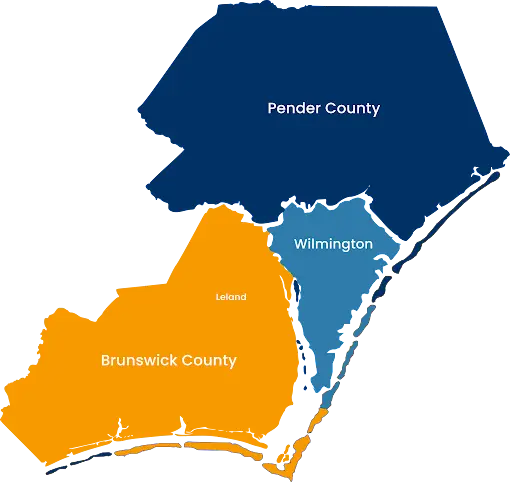
Jeffrey B. Watson earned his B.A. degree in Communications on the Dean’s List from the University of North Carolina at Greensboro, while being the Team Captain on the UNC Greensboro college basketball team. He earned his M.A. degree in Public Policy with honors from Regent University in Virginia, where he published a thesis on Medical Savings Accounts which was requested by Congress for study, interned in the Virginia Department of Public Safety, wrote speeches for Virginia Governor George Allen and Public Safety Secretary Jerry Kilgore, and co-wrote prison reform and environmental clean-up legislation which was later passed into law in Virginia. Mr. Watson also earned his J.D. degree from Campbell University, where he won a variety of national awards for his trial and appellate advocacy skills, including being a member of the Order of Old Kivett, National Moot Court team, and Campbell Law Observer.
Mr. Watson started his personal injury career as a Senior Claims Adjuster for Integon Insurance. After graduate and law school, he began his law practice as an insurance defense trial attorney. For over 21 years, Mr. Watson has been a personal injury and corporate litigation attorney, including running his own law firm for over 15 years before coming to the Speaks Law Firm.
Mr. Watson is licensed in all State and Federal court in North Carolina, and has been a member of the North Carolina Bar Association, the Forsyth County Bar Association, the Mecklenburg County Bar Association, the National Institute for Trial Advocacy, the American Bar Association, and the League of Credit Union Attorneys. He has served on the governing Boards of the Triad Hispanic Counsel, Forsyth County Family Coalition, Forgiven Ministries, Salem Pregnancy Support, Calvary Baptist Church in Winston-Salem, and the Executive Committee of the Southern Baptist Convention in Nashville, TN.
Mr. Watson has been married to his wife Lori for over 30 years, and has 3 adult sons.
Mr. Watson was selected in 2021 as a member of the National Top 100 Civil Plaintiff’s Trial Lawyers.
We respect your privacy. The information you provide will be used to answer your question or to schedule an appointment if requested.



At Speaks Law Firm, PC Family Law Division, we provide you with multimedia educational resources to help you become informed regarding your Family Law situation. We invite you to explore our library of articles and videos. The better you understand the factors in your case, the more effectively we can work together towards your goals.

Below are some frequently asked questions about Adoption:
NC has different types of adoption to meet different family needs. The types of adoption procedures in North Carolina include:
When you file an application to become an adoptive parent, you will need to perform a home study with a social worker. A home study is usually necessary (except in stepparent adoptions) so the court can determine if you can provide a safe and loving environment for a child.
It will include fingerprinting and background checks of all adults living in the home. The social worker will also interview each adult and get documentation about important lifestyle factors, including household income, education levels, demographic information, and more. Additionally, if there are already children in the home, the social worker will observe their well-being.
Not all children in foster care are available for adoption. Most will return to their families when conditions are better for them to return home. However, approximately one-third of NC’s foster care children will need the love and support of an adoptive family.
Most children in foster care available for adoption are school-aged children or siblings who need to be adopted together into the same home. Many face years of moving between foster homes. The foster care adoption lawyers with our firm at Speaks Law Firm, PC Family Law Division can help you file your petition to adopt.
If you married the love of your life and now want to adopt your spouse’s child or children, you need to find more than just “adoption attorneys near me” online. We can help you find the other biological parent to revoke their parental rights and allow you to adopt.
Adoption in NC is a complex legal process that requires applications, fees, a pre-placement assessment (home study), and proof that you and the child are a good fit. Contact our team at Speaks Law Firm, PC Family Law Division at (910) 769-7339 in Wilmington, NC, to schedule a case review with a NC adoption lawyer.
Below are some frequently asked questions about Family Law:
Our Speaks Law Firm, PC Family Law Division attorneys handle many different types of family law cases, including:
You and your spouse must separate for at least a year plus one day in order to legally divorce. You do not have to create a separation agreement to file for divorce. However, you and your spouse must have lived separately during that time, and at least one spouse must have intended for the separation to be permanent.
North Carolina is an equitable division state, meaning that each spouse retains their individual property from before the marriage, and the court will divide marital property based upon what it determines to be an equitable division for each party. For example, if one spouse will have physical custody of children from the marriage, the court will likely award the marital home to that spouse.
Know that if the court awards the marital home to one spouse, it will likely make the division of the rest of the marital property equitable with the other spouse or reduce alimony payments to account for the value of the home.
North Carolina allows divorcing spouses to request alimony and child support. A prenuptial agreement between you and your spouse may preclude your right to alimony in the event of a divorce, but the custodial parent always has a right to seek child support from the non-custodial parent. A court will determine what is in the best interest of your child(ren) regarding custody and child support.
At Speaks Law Firm, PC Family Law Division in Wilmington, NC, our family attorneys have years of experience representing spouses, parents, adoptive parents, and more in their family law cases for divorce, custody, alimony, adoption, paternity claims, separation, and post-divorce agreement modifications. For legal help, call us at Speaks Law Firm, PC Family Law Division at (910) 769-7339. We’ll speak for you.
Below are some frequently asked questions about Modifications:
Agreements made during a divorce such as alimony (spousal support) or child support payments may require updating over time.
Whether you’re seeking a modification to an alimony or child support agreement, the court will require that something significant has changed in order to grant the modification. Acceptable reasons for a post-divorce agreement modification by the court include:
Remember that child support is not for the benefit of the receiving parent but for the child. The court is extremely strict about what modifications you can make to your child support agreement and when you can make modifications. Our Wilmington family law attorneys can review your case to advise you, but generally, North Carolina will only allow modifications to child support when:
If you pay child support, you may qualify for a reduction in your payment amount if you lose your job, experience financial hardship, become disabled, or go to jail. For example, if you receive Supplemental Security Income (SSI) benefits for disability, you will likely qualify for a reduction in your child support responsibility.
A divorce modifications lawyer with Speaks Law Firm, PC Family Law Division can help you compare your current situation to your reported income and other factors when the court established your alimony or child support payments. This post-divorce agreement modifications lawyer can help you file the correct petitions with the court to request a modification. Call us at Speaks Law Firm, PC Family Law Division at (910) 769-7339 in Wilmington, NC, to schedule a case review.
Below are some frequently asked questions about Paternity:
North Carolina presumes fatherhood for a man married to the mother during her pregnancy or at the time of birth. However, if the couple is not married during that period, but are both present for the birth, they can both sign an affidavit of parentage. This act establishes paternity without requiring a DNA test or marriage between the parents.
If either the mother or father of the child wants to file a paternity action against the other, a paternity lawyer from our firm can help. A paternity action requires a DNA test. Fathers who want to claim their parental rights to visitation, custody, or child support can file an action against the mother. Mothers who want the court to enforce child support can file the action against the alleged father.
Many fathers want to establish paternity for their children for a number of reasons, including:
If you are the custodial parent and need to secure child support from a putative (alleged) father, a paternity attorney from our firm can help you file a paternity action against the father. If the court finds through a required DNA test that he is the biological father, it can require him to pay child support.
At Speaks Law Firm, PC Family Law Division, our paternity attorney will speak on your behalf. Knowing how essential establishing paternity is in cases involving child custody, child support, visitation, inheritance, and other areas of family law, we analyze each case to come to a reasonable agreement between parties.
For legal help with a paternity matter, call Speaks Law Firm, PC Family Law Division at (910) 769-7339 in Wilmington, NC.
Below are some frequently asked questions about Guardianship:
Guardianship is a legal relationship that enables a court-appointed person to make decisions on behalf of another person who cannot make decisions for themself.
Guardianship relationships are typical for children who do not have a mom or dad in the picture, and people with mental disabilities who do not have the capacity to control their own healthcare decisions or finances.
Guardians can fulfill several roles on behalf of the “ward,” or the individual under their care. Primarily, guardians act as surrogate decision-makers and advocates for their wards.
This does not mean that guardians have complete and total control over their wards, but that they are responsible for stepping in for decisions outside the wards’ comprehension or judgment. Guardians must protect their wards’ rights to make their own choices where able and applicable.
Guardianship is a legal relationship, and as such, it involves a legal, court-ordered process.
First, you must determine the type of guardianship relationship to seek. North Carolina law recognizes three guardianship relationships:
Then, you must file the appropriate documents with the clerk of courts. The clerk will then schedule a hearing that you and all interested parties must attend.
Navigating guardianship can be confusing for those with no legal background. If you’re seeking guardianship of a ward or need help altering a guardian relationship, having a guardianship attorney on your side can be highly beneficial.
Family lawyers for guardianship know this process like the back of their hands, allowing them to provide experienced, tailored advice and guidance. Your legal guardian attorney can help you determine which type of guardianship to seek, walk you through the legal process, and ensure that you fulfill your roles and relationships according to NC laws.
Alternatively, a guardianship attorney can help you end or alter a guardian relationship in which you are the ward of the guardian.
Contact our guardianship attorneys today at the Speaks Law Firm, PC Family Law Division for assistance. Call us at (910) 769-7339 or fill out our contact form to request your consultation.
This website and the information contained here within is provided by Speaks Law Firm, PC Family Law Division as a service to clients and friends. It is not intended to be a solicitation or to render legal advice. Contained in the website is information about legal issues and legal developments. Content provided is for informational purposes only and may not reflect the most current legal developments. The content is not intended, and should not be taken, as legal advice on any particular set of facts or circumstances. You should contact an attorney for advice on specific legal problems.
Use of this website or the information provided by this website, including contacting one of our attorneys, does not create an attorney-client relationship between you and the firm. Prior to the acceptance of a new client or matter, the firm must conduct a search for possible conflicts of interest (already representing another party involved in the matter), and obtain a signed engagement letter. This website should not be used to provide confidential information about a legal matter. This website may provide links to third-party websites. Such linked websites are not under the control of Speaks Law Firm, PC Family Law Division and the firm assumes no responsibility for the accuracy of the contents of such websites.